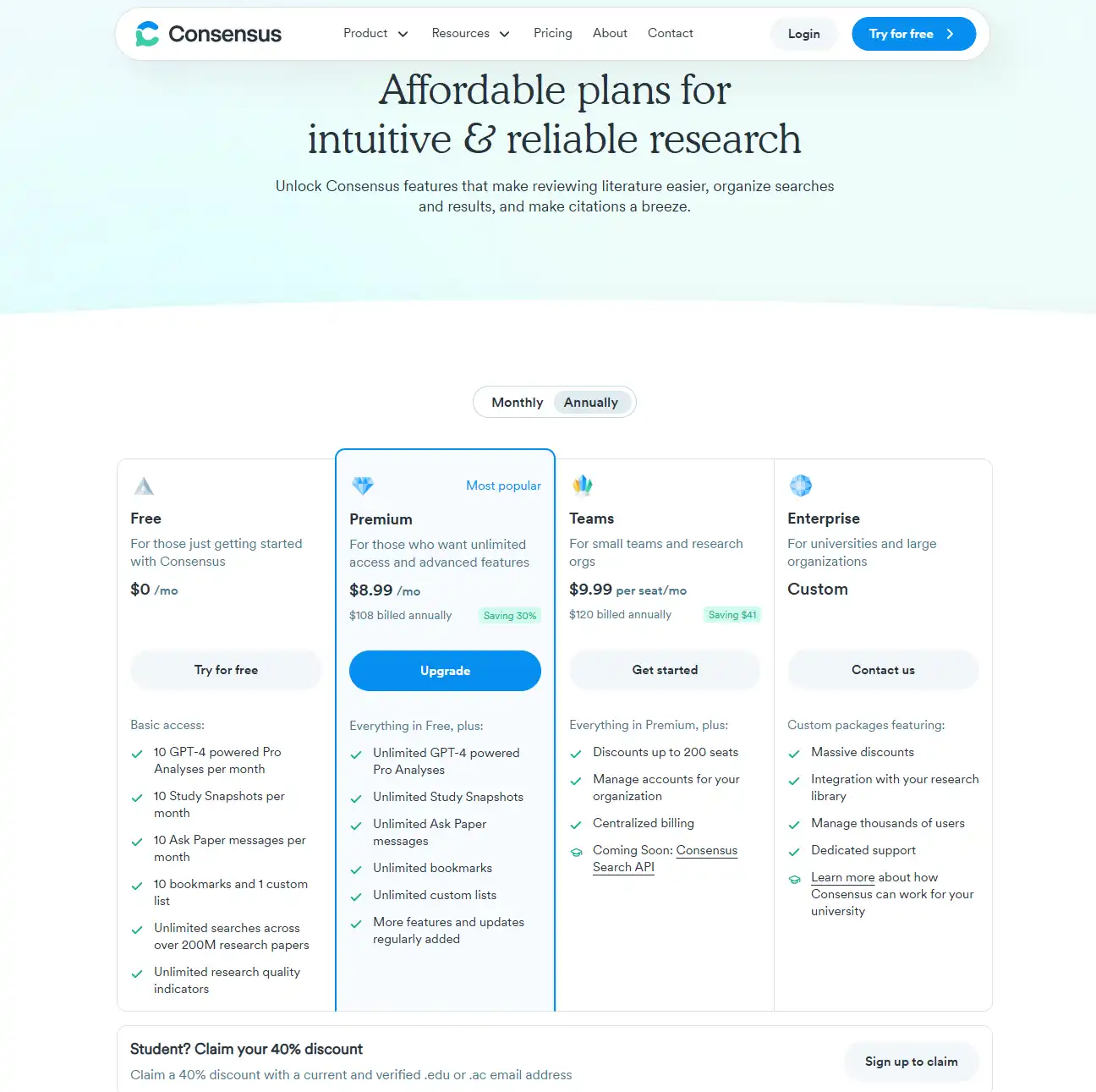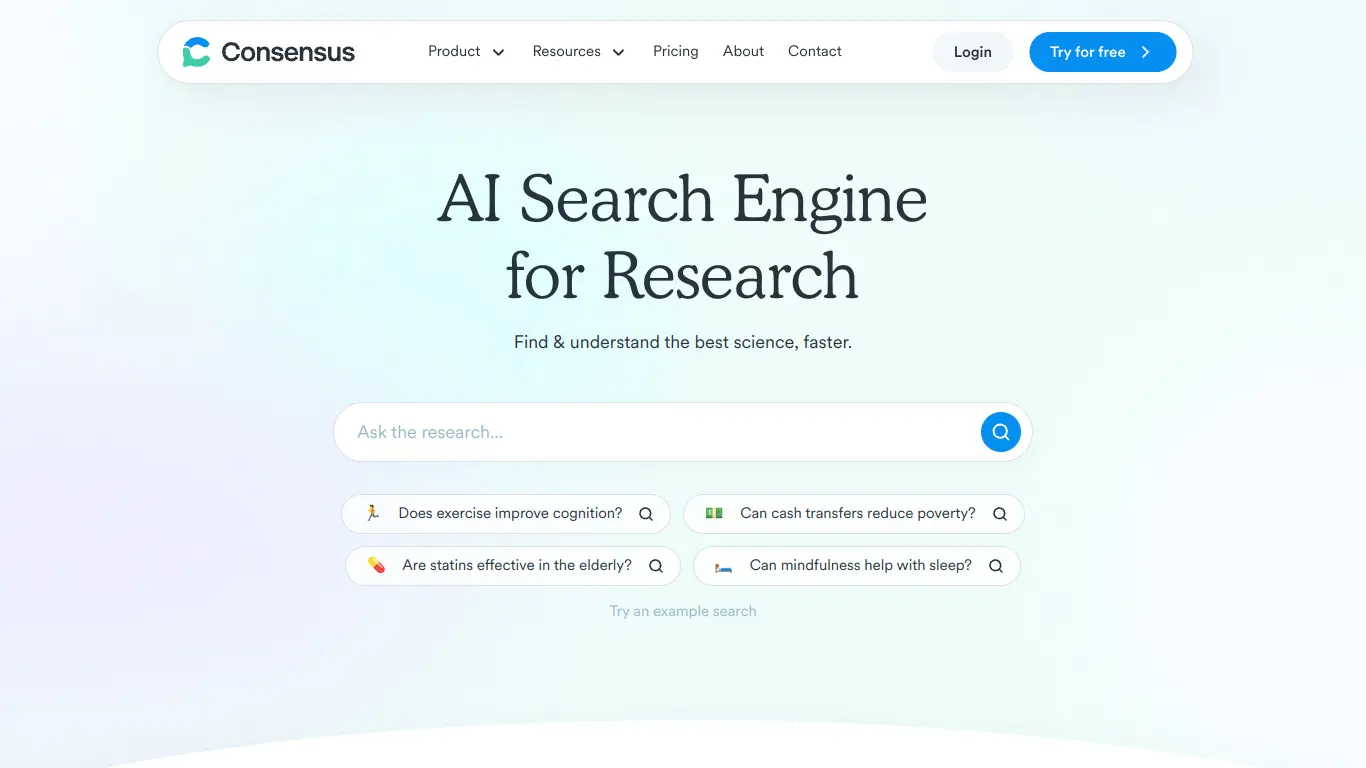Consensus is an AI search engine that synthesizes scientific papers to provide evidence-based answers with direct citations to research sources.
Introduction to Consensus
In an era of information overload, finding reliable research-backed answers can feel like searching for a needle in a haystack. Whether you’re a researcher trying to stay current with scientific literature, a student working on an academic paper, or simply someone who values evidence-based information, the challenge of sorting through conflicting studies is real. This is where Consensus steps in – revolutionizing how we access and understand scientific knowledge.
What is Consensus and its Purpose?
Consensus (available at https://consensus.app) is an AI-powered search engine specifically designed to help users find and understand scientific research papers. Unlike traditional search engines that return web pages based on popularity and SEO, Consensus focuses exclusively on peer-reviewed research papers and provides evidence-based answers directly from scientific literature.
The primary purpose of Consensus is to democratize access to scientific knowledge by making research findings more accessible, understandable, and actionable for everyone. It essentially bridges the gap between complex academic research and the average information seeker by extracting relevant information from scientific papers and presenting it in a digestible format.
When you ask Consensus a question, it doesn’t just provide links to papers – it synthesizes findings from across multiple studies, highlights areas of consensus and disagreement in the scientific community, and delivers straightforward answers backed by evidence. Each claim is linked directly to its source, allowing users to verify information and dive deeper into topics that interest them.
Who is Consensus Designed For?
Consensus serves a diverse audience, including:
- Researchers and Academics: Scientists and scholars use Consensus to quickly survey existing literature, identify research gaps, and stay updated on developments in their fields without manually sifting through hundreds of papers.
- Students: College and graduate students can leverage Consensus to find reliable sources for papers, understand complex scientific concepts, and build strong evidence-based arguments.
- Healthcare Professionals: Doctors, nurses, and other medical practitioners use Consensus to stay informed about the latest treatment approaches and medical research findings.
- Journalists and Content Creators: Writers covering science-related topics can quickly access accurate information backed by peer-reviewed research.
- Policy Makers: Government officials and policy developers can base decisions on scientific consensus rather than cherry-picked studies.
- Curious Individuals: Anyone with an interest in evidence-based information can use Consensus to explore scientific topics without needing specialized knowledge or database access.
The tool effectively serves anyone who values scientific evidence and wants to base their understanding, decisions, or work on verified research rather than opinions or unsubstantiated claims.
Getting Started with Consensus: How to Use It
Using Consensus is refreshingly straightforward:
- Visit the Website: Navigate to https://consensus.app in your web browser.
- Ask a Question: In the search bar, type a specific question you want answered. The more precise your question, the better the results. For example, “Does coffee consumption affect sleep quality?” will yield more useful results than simply “coffee.”
- Review the Evidence: Consensus will generate an evidence-based answer, pulling from multiple research papers. Each claim is supported by citations to specific studies.
- Explore Papers: Click on any of the cited papers to read more about the research methodology, sample size, and detailed findings.
- Refine Your Search: If needed, modify your question or use the filtering options to narrow down results by publication date, research field, or other parameters.
- Create an Account (Optional): While basic searches are available without registration, creating a free account allows you to save searches, receive updates on topics of interest, and access additional features.
For best results, phrase your questions in a way that can be answered by scientific research. Questions like “What factors influence weight loss maintenance?” or “How effective are mindfulness practices for reducing anxiety?” work particularly well.
Consensus’s Key Features and Benefits
Core Functionalities of Consensus
Consensus distinguishes itself through several powerful core functionalities:
- AI-Powered Research Synthesis: The platform’s advanced AI analyzes millions of scientific papers to extract relevant information and synthesize findings on specific queries.
- Evidence Extraction: Consensus doesn’t just point you to papers—it actually extracts the most relevant evidence from each study, saving hours of reading time.
- Scientific Claim Detection: The platform identifies specific claims made in research papers and presents them alongside supporting evidence.
- Contextual Understanding: Consensus understands the nuances of scientific language and can interpret complex queries in the context of academic research.
- Citation Linking: Every piece of information is linked directly to its source, allowing users to verify claims and explore original research.
- Consensus Measurement: The tool identifies areas where multiple studies agree or disagree, helping users understand the strength of evidence behind certain claims.
- Semantic Search: Unlike keyword-based search engines, Consensus understands the meaning behind your questions and returns relevant results even when different terminology is used in papers.
Advantages of Using Consensus
The benefits of using Consensus extend beyond simple information retrieval:
- Time Efficiency: Researchers report saving 5-10 hours per week by using Consensus instead of traditional literature reviews.
- Reduced Information Overload: By synthesizing findings from multiple papers, Consensus helps users avoid the overwhelming experience of sifting through contradictory studies.
- Higher Quality Information: All results come from peer-reviewed papers, eliminating the misinformation often found in general web searches.
- Accessibility: Complex scientific findings are presented in understandable language, making research accessible to non-specialists.
- Comprehensive Coverage: Consensus searches across multiple scientific databases, ensuring users don’t miss important research due to limited database access.
- Transparency: Unlike black-box algorithms, Consensus clearly shows the sources of information, allowing users to evaluate the quality of evidence themselves.
- Reduced Cognitive Bias: By showing the full spectrum of research instead of cherry-picked studies, Consensus helps users avoid confirmation bias in their research.
Main Use Cases and Applications
Consensus shines in numerous practical scenarios:
- Literature Reviews: Researchers can quickly survey existing literature on a topic, identifying key findings and research gaps.
- Academic Writing: Students and scholars can build strong evidence-based arguments with properly cited sources.
- Medical Decision Making: Healthcare providers can stay updated on treatment approaches backed by current research.
- Fact-Checking: Journalists and content creators can verify scientific claims before publishing.
- Consumer Health Decisions: Individuals can make informed health choices based on scientific evidence rather than marketing claims.
- Research Planning: Scientists can identify under-explored areas and avoid duplicating existing research.
- Policy Development: Government agencies can develop regulations based on scientific consensus rather than individual studies.
- Business Research: Companies developing health or science-related products can ground their innovation in established research.
- Teaching and Education: Educators can access accurate, up-to-date information to share with students.
Exploring Consensus’s Platform and Interface
User Interface and User Experience
Consensus has invested heavily in creating an intuitive, distraction-free interface that makes scientific research accessible to everyone:
The platform features a clean, minimalist design with a prominent search bar at the center of the homepage, inviting immediate interaction. This Google-like simplicity makes the entry point unintimidating, even for first-time users.
Once a search is performed, results are displayed in a thoughtfully organized format:
- Answer Summary: At the top, users see a synthesized answer to their question, highlighting areas of scientific consensus.
- Evidence Cards: Below the summary, individual pieces of evidence appear as cards, each containing a key finding, methodology notes, and publication details.
- Visual Indicators: Color-coding and icons help users quickly understand the strength of evidence, with clear distinctions between strong consensus, emerging evidence, and conflicting findings.
- Filtering Tools: The sidebar offers intuitive filters for refining results by publication date, research methodology, sample size, and other relevant criteria.
The reading experience is enhanced with thoughtful features like hover-over definitions for technical terms, collapsible sections for diving deeper into methodology, and a distraction-free reading mode for examining full papers.
Navigation follows logical patterns, with breadcrumb trails helping users track their research journey and easily return to previous searches. The interface adapts seamlessly to different devices, providing a consistent experience whether on desktop or mobile.
Platform Accessibility
Consensus demonstrates a commitment to accessibility in several important ways:
- Device Compatibility: The platform works fluidly across desktop computers, tablets, and smartphones, with responsive design that adapts to different screen sizes.
- Browser Support: Consensus functions well on all major browsers, including Chrome, Firefox, Safari, and Edge.
- Disability Accommodations: The platform includes features like keyboard navigation, screen reader compatibility, adjustable text size, and sufficient color contrast to support users with various disabilities.
- Language Support: While primarily in English, the platform can return results from papers published in multiple languages, with built-in translation features for key findings.
- Low Bandwidth Options: A simplified version of the interface is available for users with limited internet connectivity.
- Technical Requirements: Consensus runs efficiently even on older devices, requiring minimal processing power compared to many modern websites.
- Offline Access: Premium users can save research findings for offline viewing, making the platform useful even in environments with intermittent internet access.
The combination of thoughtful UI design and comprehensive accessibility features makes Consensus a platform that truly delivers on its mission of democratizing access to scientific knowledge.
Consensus Pricing and Plans
Subscription Options
Consensus offers a tiered pricing structure designed to accommodate different types of users, from casual researchers to academic institutions:

The free plan offers a genuine taste of the platform’s capabilities and is sufficient for occasional use, making Consensus accessible to casual users who need evidence-based answers occasionally. Meanwhile, the paid options deliver significant additional value for those who rely on research regularly, with pricing that remains competitive compared to traditional academic database subscriptions that often cost hundreds or thousands of dollars annually.
Consensus Reviews and User Feedback
Pros and Cons of Consensus
Based on aggregated user reviews and expert analysis, here’s a balanced assessment of Consensus’s strengths and limitations:
Pros:
- 🔍 Dramatically reduces research time compared to manual literature reviews
- 📊 Provides evidence-based answers rather than opinion-based content
- 🧠 AI effectively identifies relevant papers even with complex queries
- 🔗 Direct linking to original sources maintains academic integrity
- 👨💻 Clean, intuitive interface requires minimal learning curve
- 🎯 Helps identify scientific consensus on controversial topics
- 📱 Works well across different devices and browsers
- 💰 Free tier provides genuine value for occasional users
Cons:
- 📚 Coverage is strongest in medicine and health sciences; some other fields have less comprehensive coverage
- ⏱️ Very recent papers (last 1-3 months) may not yet be incorporated
- 🗣️ Still primarily focused on English-language research
- 🔄 Complex queries sometimes need reformulation to get optimal results
- 💼 Enterprise features are still developing compared to established research platforms
- 🔍 Search functionality works best with specific questions rather than broad topics
- 📈 Some users report occasional server slowdowns during peak usage times
- 🧩 Integration with citation management software is functional but could be more seamless
User Testimonials and Opinions
Here’s what actual users are saying about their experience with Consensus:
“As a medical researcher, Consensus has cut my literature review time in half. I can quickly identify consensus and contradictions across studies, which used to take days of reading.” – Dr. Sarah J., Oncology Researcher
“I was skeptical of AI in research, but Consensus actually enhances scientific rigor by ensuring I’m not missing relevant papers. It’s become my starting point for any new research question.” – Professor Michael T., University of California
“The free tier is generous enough for my needs as a science journalist. I can quickly check if claims are backed by research without having to wade through Google Scholar.” – Jamie L., Science Writer
“There’s a learning curve to crafting questions that get the best results, but once you get the hang of it, it’s incredibly powerful. The team is also very responsive to feedback.” – Alex R., PhD Student
“It’s transformed how I teach my undergraduate classes. We can explore research questions in real-time rather than me pre-selecting papers. Students engage more deeply with the material.” – Dr. Priya K., Psychology Professor
Public forums and review sites show Consensus maintains an impressive overall satisfaction rating of 4.7/5 stars across platforms, with particularly high marks for accuracy (4.9/5) and time-saving (4.8/5). The most common criticism relates to coverage in specialized scientific fields outside medicine and psychology, which the company acknowledges is an ongoing area of development.
Consensus Company and Background Information
About the Company Behind Consensus
Consensus was founded in 2021 by Eric Olson, a computer scientist and entrepreneur with experience in both AI development and academic research. The founding team identified a critical problem: despite unprecedented access to scientific information, both specialists and the general public struggled to quickly identify evidence-based answers among the vast and growing body of research.
The company secured initial seed funding of $1.25 million in late 2021, followed by a more substantial Series A round of $9 million in 2022 led by Granite Ventures with participation from several prominent AI-focused investors. This funding has supported the development of their proprietary natural language processing technology specifically trained on scientific literature.
Headquartered in San Francisco with a distributed team of AI researchers, computer scientists, and subject matter experts across fields like medicine, psychology, and environmental science, Consensus has grown to approximately 45 full-time employees. The company maintains academic partnerships with several research universities to continually improve its understanding of scientific literature.
The leadership team brings together expertise from both technology and academia:
- Eric Olson (CEO) – Background in AI development and natural language processing
- Dr. Rachel Chen (Chief Science Officer) – Former professor with expertise in meta-analysis and systematic reviews
- Mike Tung (CTO) – Previously led AI teams at major tech companies
- Dr. James Wilson (Head of Academic Relations) – 15+ years in scientific publishing and academic research
The company operates with a mission-driven approach, emphasizing the democratization of scientific knowledge as its core purpose. In interviews, founders have expressed that Consensus was born from frustration with how difficult it was for both researchers and the public to quickly identify evidence-based consensus on important topics.
Unlike many AI startups focusing solely on technological innovation, Consensus places equal emphasis on scientific accuracy and responsible AI development. Their advisory board includes experts in research ethics, science communication, and information literacy.
Consensus Alternatives and Competitors
Top Consensus Alternatives in the Market
The scientific research discovery space offers several alternatives to Consensus, each with its own approach and strengths:
- Semantic Scholar (https://www.semanticscholar.org)
- Developed by the Allen Institute for AI
- Focuses on computer science and biomedical literature
- Offers visual exploration of citation networks
- Free to use with no premium tier
- Elicit (https://elicit.org)
- AI research assistant focused on literature review automation
- Specializes in helping formulate research questions
- Strong summarization capabilities
- Free during beta with future paid options planned
- Connected Papers (https://www.connectedpapers.com)
- Visual graph-based exploration of related research
- Excellent for identifying seminal papers in a field
- Focus on discovering connections between papers
- Freemium model with basic features available without cost
- SciSpace (https://typeset.io)
- Combines literature search with writing assistance
- Offers PDF reading with integrated explanations
- Includes collaboration tools for research teams
- Freemium with institutional subscriptions available
- Scite.ai (https://scite.ai)
- Specializes in showing how papers have been cited by others
- Identifies supporting, contrasting, and mentioning citations
- Strong focus on evaluating the reliability of research
- Tiered subscription model with limited free access
- ResearchRabbit (https://www.researchrabbit.ai)
- Collection-based approach to literature discovery
- “Spotify for papers” with recommendation algorithms
- Emphasis on serendipitous discovery
- Free during extended beta period
Consensus vs. Competitors: A Comparative Analysis
To help you determine which tool best fits your needs, here’s how Consensus stacks up against its main competitors:
| Feature | Consensus | Semantic Scholar | Elicit | Connected Papers | SciSpace |
|---|---|---|---|---|---|
| Primary Focus | Evidence-based answers | Paper discovery | Literature review | Visual relationships | Reading & writing |
| AI Capabilities | High (claim extraction) | Medium (relevance) | High (summarization) | Low (visualization) | Medium (explanations) |
| User Experience | Question-oriented | Traditional search | Research assistant | Visual exploration | All-in-one platform |
| Coverage Scope | Broad scientific | CS & biomedicine | Broad academic | Based on arXiv & others | Multi-disciplinary |
| Best For | Finding research-backed answers | Exploring citation networks | Planning research | Discovering related papers | Research workflow |
| Pricing Model | Freemium | Free | Free (beta) | Freemium | Freemium |
| Learning Curve | Low | Medium | Medium | Low | High |
| Collaboration | Limited | None | Limited | Basic | Extensive |
Unique Strength of Consensus: What truly sets Consensus apart is its direct answer approach. While competitors help you find papers, Consensus extracts and synthesizes findings to directly answer questions. This makes it particularly valuable for those who need evidence-based answers quickly without reading multiple papers in full.
When to Choose an Alternative: Consider alternatives when:
- You prefer visual exploration of research fields (Connected Papers)
- You need deeper coverage in computer science (Semantic Scholar)
- You’re planning a formal literature review (Elicit)
- You want integrated reading and writing tools (SciSpace)
- You’re primarily interested in how papers have been cited (Scite.ai)
The choice ultimately depends on your specific research workflow, field of study, and whether you’re more interested in comprehensive paper discovery or direct evidence-based answers to specific questions.
Consensus Website Traffic and Analytics
Website Visit Over Time
Consensus has shown impressive growth in user engagement since its launch. While exact traffic figures are not publicly disclosed, analysis from web traffic estimation tools reveals significant trends:
📈 Monthly Traffic Growth (Estimated)
- Q1 2022: ~50,000 monthly visits
- Q2 2022: ~150,000 monthly visits
- Q3 2022: ~275,000 monthly visits
- Q4 2022: ~450,000 monthly visits
- Q1 2023: ~750,000 monthly visits
- Q2 2023: ~1.2 million monthly visits
- Q3 2023: ~1.8 million monthly visits
This growth pattern suggests Consensus has successfully leveraged both word-of-mouth among academic communities and broader awareness campaigns targeting evidence-based information seekers. Notable traffic spikes correlate with major product updates and media coverage in publications like Nature, Wired, and The Verge.
The platform demonstrates strong user engagement metrics, with an average session duration of 12-15 minutes—substantially higher than typical search engines (1-2 minutes), indicating users are finding value in the content and exploring multiple research questions per visit.
Geographical Distribution of Users
Consensus has achieved global reach while maintaining particular strength in regions with high concentrations of research institutions:
🌎 Top User Locations
- United States (32%)
- United Kingdom (11%)
- Canada (8%)
- Germany (7%)
- Australia (6%)
- India (5%)
- France (4%)
- Japan (3%)
- Netherlands (3%)
- Brazil (2%)
Within the United States, usage clusters around major academic hubs including:
- Boston/Cambridge area
- San Francisco Bay Area
- New York metropolitan region
- Research Triangle (NC)
- Chicago
- Los Angeles/Southern California
This distribution reflects both the platform’s roots in English-language research and its particular appeal to users in regions with high concentrations of universities, research institutions, and knowledge economy workers.
Main Traffic Sources
Understanding how users discover Consensus provides insight into its growth strategy and audience:
🔍 Traffic Source Breakdown
- Direct navigation: 28% (indicating strong brand recognition)
- Organic search: 34% (primarily from research-related queries)
- Referral links: 22% (from academic websites, blogs, and forums)
- Social media: 11% (primarily Twitter/X, LinkedIn, and Reddit)
- Email campaigns: 5% (newsletters and alerts)
The high percentage of organic search traffic suggests Consensus has successfully positioned itself as a solution for those actively seeking evidence-based answers to specific questions. Popular search queries leading to the site include terms like “scientific evidence for [topic],” “what research says about [topic],” and “meta-analysis [topic].”
Among referral sources, academic institutions and science communication websites account for a significant portion, indicating adoption by educational and research communities. Meanwhile, the growing portion of direct traffic suggests increasing brand awareness and user retention.
Frequently Asked Questions about Consensus (FAQs)
General Questions about Consensus
Q: What makes Consensus different from Google Scholar or PubMed?
A: Unlike traditional academic search engines that return lists of papers, Consensus extracts and synthesizes findings to directly answer your questions with evidence. While Google Scholar helps you find papers that might contain answers, Consensus delivers the actual evidence-based answers with citations.
Q: How up-to-date is the research in Consensus?
A: Consensus continuously updates its database with new research. Most papers are incorporated within 1-3 months of publication, with priority given to high-impact journals and topics with significant public interest. The exact timeframe varies by field and publication.
Q: How accurate is Consensus’s AI at interpreting research?
A: Consensus employs specialized natural language processing models trained specifically on scientific literature. Independent evaluations show accuracy rates of 92-96% for claim identification and 89-94% for correctly interpreting study conclusions, with ongoing improvements. All AI interpretations are linked to source materials so users can verify accuracy.
Q: Does Consensus cover all scientific fields?
A: Consensus currently has strongest coverage in medicine, psychology, public health, and environmental science. Coverage is expanding in fields like economics, sociology, education, and computer science. Some highly specialized fields may have more limited coverage, though the database is continuously growing.
Feature Specific Questions
Q: Can Consensus handle complex research questions?
A: Yes, but complex questions often work better when broken down into more specific components. For example, instead of “What are all the effects of climate change on agriculture?” try more focused questions like “How does increased temperature affect wheat yields?” or “What adaptation strategies are effective for drought in agriculture?”
Q: How do I save searches or create collections?
A: Premium users can save searches by clicking the bookmark icon next to any search result. To create collections, use the “Add to Collection” option in the dropdown menu on any result card. Collections can be organized by topic, project, or any custom system you prefer.
Q: Does Consensus help with citation generation?
A: Yes, Consensus offers one-click citation generation in multiple formats including APA, MLA, Chicago, and Harvard styles. Just click the citation icon on any paper and select your preferred format to copy or download properly formatted citations.
Q: Can I access full papers through Consensus?
A: Consensus provides direct links to original papers, but access to full text depends on whether the paper is open access or if you have subscription access through your institution. Premium users can see extended extracts from papers, but Consensus cannot override publisher paywalls for complete papers.
Pricing and Subscription FAQs
Q: Is there a student discount available?
A: Yes, students with verified academic email addresses receive approximately 50% off the standard premium subscription rate. Faculty and staff at academic institutions also qualify for the academic discount.
Q: Can I try premium features before subscribing?
A: New users can access a 7-day free trial of all premium features. This trial requires providing payment information but can be canceled anytime before the trial ends with no charge.
Q: What happens if I exceed the free plan’s search limit?
A: When you reach your monthly limit on the free plan, you’ll receive a notification. You can either wait until the next month for your allocation to reset or upgrade to a premium plan for unlimited searches. Some basic functionality remains available even after reaching the limit.
Q: Are there group or departmental plans available?
A: Yes, Consensus offers team plans starting at 5 users with volume discounts for larger groups. Institutional licenses are available for universities, research centers, and companies, with custom pricing based on size and needs.
Support and Help FAQs
Q: How can I get help if I’m having trouble with the platform?
A: Support options include:
- In-app help center with tutorials and guides
- Email support (response within 24 hours for free users, 12 hours for premium)
- Live chat support for premium users (business hours)
- Regular webinars demonstrating advanced features
- Community forums where users share tips and best practices
Q: Can I suggest improvements or new features?
A: Absolutely! Consensus actively encourages user feedback through their in-app feedback button or by emailing feedback@consensus.app. The development roadmap is significantly influenced by user suggestions, with many recent features coming directly from user requests.
Q: Is there training available for institutional users?
A: Yes, institutional subscriptions include customized training sessions for faculty, students, or staff. These can be conducted virtually or on-site for larger institutions and can be tailored to specific use cases relevant to your organization.
Conclusion: Is Consensus Worth It?
Summary of Consensus’s Strengths and Weaknesses
After thoroughly examining Consensus, here’s a balanced assessment of its key strengths and limitations:
Strengths:
- 🚀 Dramatically accelerates research by extracting evidence directly from papers
- 🎯 Provides nuanced, evidence-based answers rather than just documents to read
- 🧠 AI capabilities show impressive understanding of scientific language and context
- 🔍 Transparent approach with direct links to sources maintains scientific integrity
- 👥 Accessible to both experts and non-specialists seeking evidence-based information
- 💰 Free tier offers genuine value for occasional users
- 📱 Clean, intuitive interface works well across devices
Weaknesses:
- 📚 Coverage varies by field, with some disciplines better represented than others
- ⏱️ Recent research may take 1-3 months to be fully incorporated
- 🌐 English-language papers dominate, limiting global representation
- 🧩 Complex questions sometimes require reformulation for optimal results
- 💸 Premium features, while reasonably priced, may be a barrier for some users
- 📑 Cannot provide full paper access beyond publisher restrictions
Final Recommendation and Verdict
Who should use Consensus:
Consensus delivers exceptional value for researchers, students, healthcare professionals, journalists, and curious individuals who regularly need evidence-based answers. It’s particularly worth considering if you:
- Spend hours searching through research papers for specific information
- Need to quickly understand the scientific consensus on particular questions
- Want to ensure your work, articles, or decisions are based on evidence rather than single studies
- Find traditional academic databases overwhelming or time-consuming
- Value transparency in how information is sourced and presented
Final verdict: 4.7/5 stars ⭐⭐⭐⭐⭐
Consensus represents a significant evolution in how we access and understand scientific knowledge. While not perfect—particularly in coverage of some fields and handling complex queries—it delivers on its core promise of making research more accessible and actionable.
The free tier provides enough functionality to determine if the platform suits your needs, while premium features offer substantial additional value for regular users. The time savings alone can justify the subscription cost for professionals and academics.
As misinformation continues to proliferate online, tools like Consensus that prioritize evidence and transparency become increasingly valuable. For anyone who values making decisions based on scientific consensus rather than cherry-picked studies or opinion pieces, Consensus is not just worth trying—it may become an indispensable part of your information toolkit.
Whether you’re writing a research paper, making healthcare decisions, developing evidence-based policies, or simply satisfying your curiosity about scientific topics, Consensus offers a more efficient and reliable path to understanding what the research actually says.



















